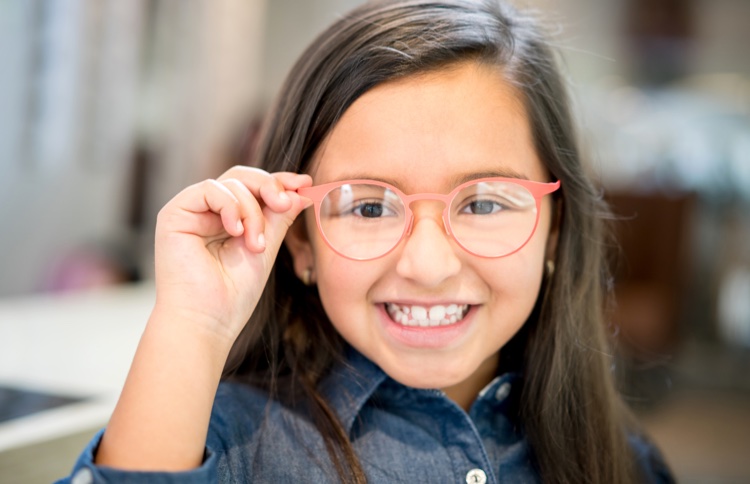Eye health
Healthy eyes help support a healthy body
You may know that maintaining a healthy diet and regularly moving your body is good for your health, but did you know it may also be good for your eyes, too? Zinc and omega-3 fatty acids and protein found in salmon and tuna, along with eggs and fruits and veggies (particularly spinach) are great for eye health, as is getting regular exercise and adequate sleep.1 There are other ways you might protect and preserve your eyesight as you age.
It is possible to keep your eyes healthy at every stage of life. To schedule a screening or eye exam — which may often be covered by vision insurance —contact your vision care provider or find a doctor.

Ways to help protect your vision
- Turn off electronic devices before bed. Bedrooms should be “screen-free” zones for kids.2
- Take care of the surfaces of your eyes. Your eyes might feel tired after staring at a screen because you aren’t blinking enough. Take a break and rest your eyes. Follow the 20-20-20 rule: Take a 20 second break every 20 minutes and look at something 20 feet off in the distance.3
- If you smoke, consider quitting. Smoking increases the risk of serious eye conditions.4 Quit For Life® has helped 4 million members successfully quit smoking, e-cigarettes, vaping, nicotine and tobacco – and it may help you too.
- Wear sunglasses and wide-brimmed hats that block ultraviolet (UV) radiation when exposed to sunlight—in summer and in winter.
- Don’t sleep in your contacts. This may lead to an eye infection.
- Adjust the lighting to your task, including the brightness on your computer screen and the light when you’re reading.
- Throw away eye makeup after 3 months to help prevent infection-causing bacteria buildup.5
- Consider eye protection for computer light, like eyeglasses or contact lenses that might be designed for computer work. Special blue light computer reading glasses are made with an anti-reflective coating to reduce glare, and a tint to increase contrast.
- Wear protective eyewear when playing sports that involve a ball or racquet. It is recommended that kids also protect their eyes when playing with toys such as air guns or bow and arrows.6
- Wear safety glasses when using power tools for grinding metal or cutting wood. These glasses may protect your eyes from dangerous particles that might cause longlasting damage.
If you notice changes in your vision, or if it’s been a while since you had your eyes checked, you may want to consider scheduling an appointment for a comprehensive, dilated eye exam.
When should children have their eyes examined? When should you make that first appointment?
It is recommended that infants have comprehensive eye exams around 6 months. The American Optometric Association, or AOA, recommends additional eye exams at age 3, then again at age 5. School-aged children (after age 5) should have an eye exam at least every 2 years, if no vision correction is required.7
Some common vision issues in children
Some vision issues that may start in early childhood are treatable when identified, such as amblyopia, when one eye is weaker than the other, an issue that may lead to long-term vision problems. Other common pediatric eye issues may include:
- Astigmatism/farsightedness/nearsightedness—abnormalities of surface of the eye that prevent light from being properly focused on the retina
- Excessive tearing/epiphora—due to blockage of the tear drainage system
- Double vision
- Genetic eye disease
- Pediatric cataracts
- Pediatric glaucoma
If your pediatrician or family doctor thinks there may be an issue, your child may be referred to a pediatric eye doctor. Many vision problems in kids can be treated successfully if caught early.8
When should you have your eyes examined as an adult?
How often should you have your eyes checked as you get older? Routine eye screenings are crucial to preserving your sight. The good news is that many vision insurance plans cover part or all the cost of these exams. Even if your eyes are healthy, you don’t wear glasses or contacts, and have no family history of eye disease, it’s recommended to get a complete eye exam once in your twenties and twice in your thirties.
Be sure to head back in when you hit the big 4-0. That’s when early signs of disease and vision changes may show up during an eye exam. After this visit, your ophthalmologist will let you know how often you should have your eyes checked moving forward. If you’re 65 or older, consider getting an eye exam every year or 2, unless your doctor says otherwise9
If you notice changes in your vision, or if it’s been a while since you had your eyes checked, you may want to consider scheduling an appointment for a comprehensive, dilated eye exam.
Common eye diseases as you get older
Getting older may not mean that you’ll lose your vision. Most common conditions can be treated, delayed or reversed if your eye doctor identifies the problem early in its development. According to the National Eye Institute (a division of the National Institutes of Health), glaucoma, macular degeneration and cataracts are the most common eye diseases in those 40 and older.9 It’s important to have regular screenings for these diseases.

Cataracts
Nearly half of all Americans 80 or over have cataracts or had cataract surgery.10Cataracts is a normal part of aging caused by a breakdown in the proteins on the lens of your eyes. It may make your vision cloudy or blurry, make colors look faded, cause halos around lights, cause you to see double or make it harder to see at night. Cataract surgery, when doctors take out the cloudy part of your lens and replace it with an artificial lens, helps approximately 9 out of 10 people see better afterward.10

Glaucoma
According to the CDC, glaucoma is the name given to group of conditions that damage the optic nerve at the back of the eye (the one that sends visual signals to the brain). While there is no cure for glaucoma and typically no symptoms to serve as warning signs, if it’s recognized in the early stages—through regular eye screenings— you can save your remaining eyesight.11

Macular degeneration
It’s estimated that 1.8 million Americans age 40 and older are affected by age-related Macular Degeneration. Associated with aging, this slow-moving and painless eye disorder is the leading cause of severe vision loss in people over 60 — affecting more people than glaucoma and cataracts combined.12 It occurs when the macula, a small part of the retina (the light-sensing nerve tissue at the back of the eye), deteriorates. There is no cure for macular degeneration, but early detection and treatment may slow the progression of vision loss.
Health and lifestyle factors may impact your vision
Diabetes and your vision
Diabetes may affect your eyes, causing blurred vision. When blood sugar levels go up, blood vessels in the eyes get thicker and may make it difficult to focus. The swelling is often temporary, with vision returning as glucose levels return to normal. When you have diabetes, it’s common for an ophthalmologist to perform special examinations to make sure your eyes stay as healthy as possible long into the future.13
Computer vision syndrome
These days, it’s nearly impossible to get away from staring at computers, tablets, video games, TVs and cell phones. Computer vision syndrome (CVS), or digital eye strain, may be a common side effect.3
More like this: